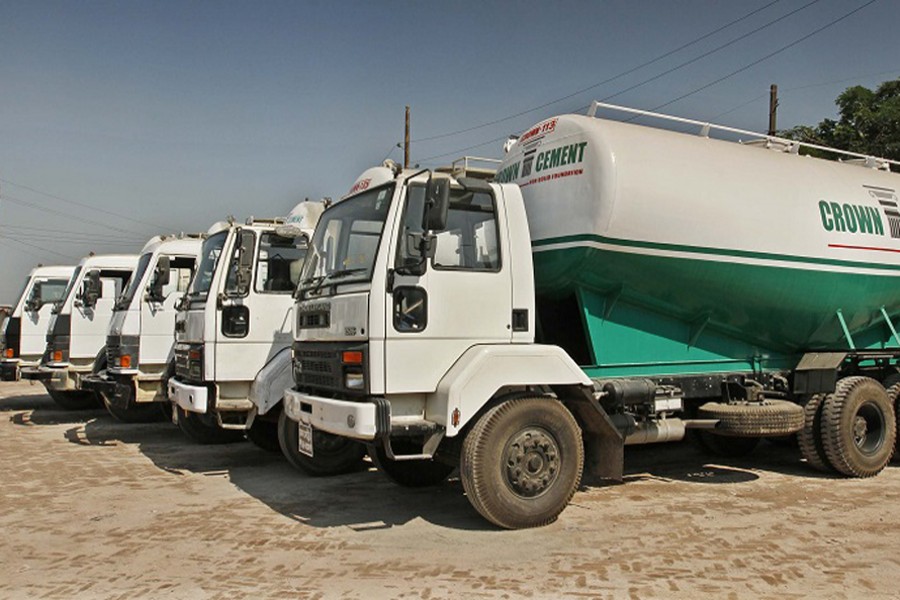Virus pandemic threatens to pulverise cement sector
46pc fall in sales in April

Published :
Updated :

The current demand for cement declines drastically as the country-wide constructions, including that of mega projects, have almost come to a halt following the prolonged lockdown enforced to flatten the curve of Covid-19.
The sales of cement dropped around 46 per cent in April following serious disruptions in constructions, according to information of Bangladesh Cement Manufacturers Association (BCMA).
The manufacturers have observed the severe fall in sales, despite they had expected double digit growth in 2020 after achieving above 7.0 per cent growth in previous year.
The BCMA president Md. Alamgir Kabir said the sales of cement declined drastically as the novel corona virus has crippled the Tk 300 billion industry.
"Our apprehension is that in the upcoming months and indeed the full year, the drop in sales of cement will be significant as the economy will take time to revive," Mr. Kabir said.
According to the BCMA information, the annual demand for cement in normal situation is around 33 million tonnes against the installed capacity of around 78 million tonnes.
The manufacturers earlier also expected to enhance their capacity by another 11 million tonnes in next three years.
Mr. Kabir acknowledged that many local manufacturers installed capacity without proper analysis in respect to feasibility, future trend and other relevant factors over the last 5-8 years.
"The logics which inspired the manufacturers to install capacity significantly also did not work properly due to various reasons including the crash earlier observed in real estate," said Mr. Kabir.
He said the cement manufacturers are also bearing the burden of their unused capacity, nearly 45 per cent, installed for better days.
Total investments in cement sector stood at around Tk 300 billion, of which Tk 190 billion came through the bank loans.
Although more than 75 cement manufacturing companies have been installed in Bangladesh, currently 35 large and small scale companies are producing cement for local and overseas markets.
Asked, the managing director of Confidence Cement Zahir Uddin Ahmed said the sales of individual manufacturers have dropped ranging from 50 per cent to 80 per cent amid the ongoing lockdown.
"People now are busy to meet expenses of daily essentials amid the ongoing crisis. Apart from closing most of the ongoing constructions, many individual home builders have also deferred their construction plans," said Mr. Ahmed, also the vice president of BCMA.
He said the disruptions in different mega projects affected the demand of cement significantly.
"Apart from the ongoing decline in sales, the manufacturers are bearing the burden of the unused capacity earlier installed with a hope of better business," said Mr. Ahmed.
According to BCMA, the government's measures taken to contain the infection of the deadly virus have suspended/delayed the construction works of all major infrastructure projects including the Padma Bridge, Rooppur Nuclear Power Plant, Matarbari Power Plant, Karnaphuli River Tunnel and Dhaka Metro Rail.
The manufacturers said the delay in the constructions of mega projects has affected the sales of cement significantly.
Apart from two multination companies, the listed local cement companies are Aramit Cement, Confidence Cement, Meghna Cement, M. I. Cement and Premier Cement.
Bangladesh is still one of the lowest consuming countries of cement products in the world.
Per capita consumption in Bangladesh was about 200 kg, while it is about 1700 kg in China, 1250 kg in South Korea, 800 kg in Malaysia, 500 kg in Thailand, 270 kg in Myanmar and 312 kg in India.
According to data of BCMA, individual house builders consume 50 per cent of demand, developers/contractors grab about 25 per cent and the government controlled projects fill up the remaining 25 per cent.
mufazzal.fe@gmail.com


 For all latest news, follow The Financial Express Google News channel.
For all latest news, follow The Financial Express Google News channel.